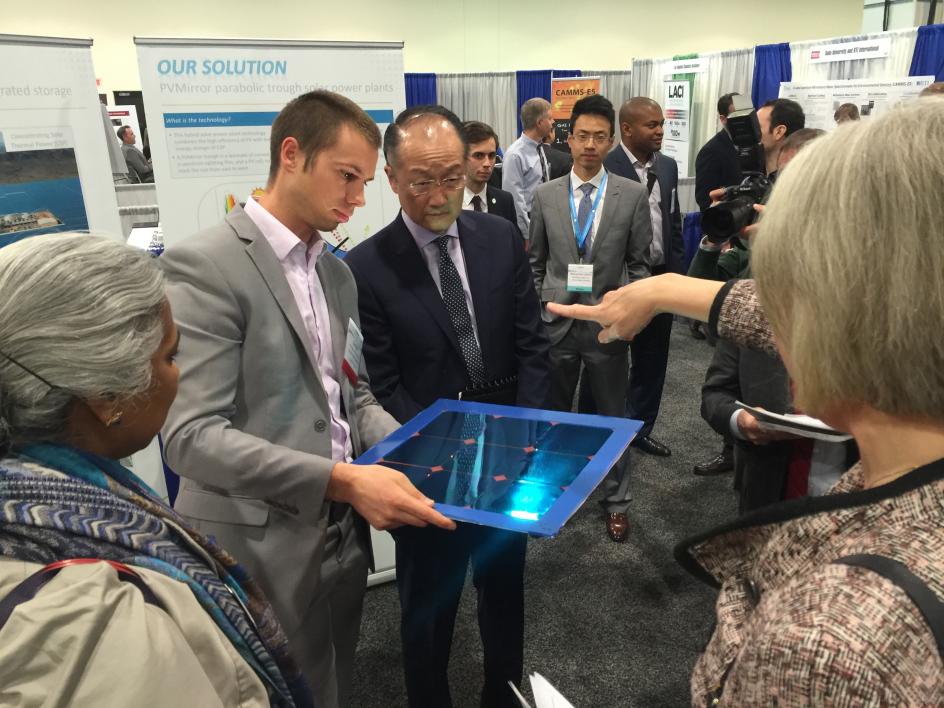ASU professor’s ‘solar exposure’

ASU assistant professor Zak Holman explains his PVMirror invention to former Vice President Al Gore at the recent ARPA-E summit.
Taking part in a high-visibility event near the nation’s capital means you need to be on your toes. Just ask Zak Holman, an assistant professor in the School of Electrical, Computer and Energy Engineering in ASU’s Ira A. Fulton Schools of Engineering. He was displaying a technology at the recent ARPA-E Energy Innovation Summit near Washington, D.C., when Al Gore, the former vice president, walked up and asked him about the PVMirror Holman had invented.
“I was totally impressed with Al Gore’s technical knowledge,” Holman said of the encounter. “I made it about 15 seconds into my usual spiel before he interrupted me with a string of questions about the technology and its marketability.”
“He wanted to know if there was a thin film in PVMirrors that does the spectrum splitting (answer is yes), what it is made from (polymers), what fraction of the electricity is dispatchable (50 percent), what the projected efficiency and cost increases are compared to conventional concentrating solar thermal power systems (40 percent and 10 percent, respectively), and how long it would take to realize those projected values — all good questions,” Holman said.
Holman’s PVMirrors were part of a LightWorks display put on by Arizona State University for the ARPA-E (Advanced Research Projects Agency - Energy) event. At the summit, 14 ASU professors, staff and students took part in the three-day event. They had the chance to show off their work to several people, including dignitaries.
Other energy technologies included in the ASU/LightWorks booth were Indium-Gallium-Nitride thermionic topping solar cells that provide energy on demand at low cost; an electrochemical CO2 capture-and-release device; a carbon capture device; and diamond power transistors enabled by phosphorous-doped diamond.
But Holman’s PVMirrors stole the show.
“Zak was certainly a rock star at the summit this year, his booth (part of the larger ASU LightWorks booth) was a featured booth for the VIP tours organized by ARPA-E,” said Steve Goodnick, a professor in the School of Electrical, Computer and Energy Engineering and also an exhibitor at the event. “They also showed his project in a video between sessions at the plenary.”
Jim Yong Kim, president of the World Bank, tells ASU engineer Zak Holman that there will be a place in the world for his solar technology. Photo courtesy of Leon Meng
Holman explained his invention’s basic operation.
“PVMirrors are a technology intended to lower the cost and increase the value of solar energy,” Holman said. “Our approach to lowering the cost is to maximize the efficiency with which sunlight is converted to electricity. PVMirrors do this by splitting the solar spectrum, illuminating photovoltaic cells with only the colors of light that the cells ‘like’ (near-infrared), and using the rest of the colors (visible and infrared light) to generate heat, which can be converted to electricity at a later time using a steam turbine. This increases the overall efficiency of the system, and it enables solar energy at night.”
He added that he was inspired by another visitor to his booth.
“Jim Yong Kim (head of the World Bank) was very interested and supportive of the technology, and made a point to let me know that the world needed to keep pushing clean-energy technologies, and that there would be money to support them,” Holman said.
More Science and technology

ASU postdoctoral researcher leads initiative to support graduate student mental health
Olivia Davis had firsthand experience with anxiety and OCD before she entered grad school. Then, during the pandemic and as a…

ASU graduate student researching interplay between family dynamics, ADHD
The symptoms of attention deficit hyperactivity disorder (ADHD) — which include daydreaming, making careless mistakes or taking…

Will this antibiotic work? ASU scientists develop rapid bacterial tests
Bacteria multiply at an astonishing rate, sometimes doubling in number in under four minutes. Imagine a doctor faced with a…
